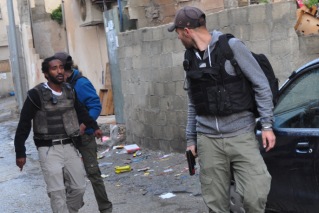 Security guards in East Jerusalem (Photo by ACRI)
Security guards in East Jerusalem (Photo by ACRI)
The High Court of Justice today (13 December 2012) issued an order nisi instructing the state to explain the deployment of private security guards in Jewish settlement compounds in East Jerusalem.
The decision follows Wednesday’s hearing on a petition by ACRI against the use of private security guards under the control of the Ministry of Housing in Jewish settlement compounds in East Jerusalem. The state has four months to explain why the Housing Ministry should have the authority for security arrangements in the Jewish neighborhoods of East Jerusalem, rather than the Internal Security Ministry. The state must also explain why the responsible ministry should not re-examine the authorities given to these security guards.
The justices were highly critical of the deployment of the private security guards during this week’s hearing and questioned the professional qualifications of the Housing Ministry to supervise such a security force. The state argued that the guards have formal responsibilities only inside the settlers’ homes and compounds, while in public spaces they are allegedly “just like any private civilian”. But the court criticized this position, with Justice Uzi Fogelman responding that when 350 security guards “are armed with weapons and carry out patrols in the area, they come across as having authority. How does a regular passerby understand their role?… And is it not the role of the police to protect the general public walking on the street?”
ACRI and Palestinian residents of East Jerusalem petitioned the High Court in October 2011 against the deployment of the guards throughout East Jerusalem. Stationed in the heart of residential areas such as Silwan and the Old City, 350 private security guards, financed by Israeli taxpayers, are charged with protecting some 2,000 Jewish Israeli settlers living in enclaves in the predominately Arab neighborhoods. The armed guards carry out daily policing duties such as patrols and guard watch without proper supervision and guidelines. In September 2010, Silwan resident Samer Sarhan was shot and killed by a security guard. More than two years later, the case is still under police investigation, and no charges have been filed yet.
ACRI Attorney Keren Tzafrir argued that the operation of a private security force constitutes an unlawful privatization of core policing responsibilities, disregards the responsibility of the state to provide protection to all residents, rests on vague or unknown procedures and laws, and violates the basic rights of Palestinians. Attorney Tzafrir stressed that security guards are not civil servants who are obligated to a clear and known code of ethics, but rather are private citizens employed by a private security company through a contract signed by the Housing Ministry, a body that should not be supervising public safety and order.
In 2006, a public committee convened by then-Housing Minister Isaac Herzog and under the direction of Major General (res.) Ori Orr, made the unequivocal recommendation that responsibility for the security of these areas should be returned to the Ministry of Internal Security and to the Israel Police. Yet shortly thereafter the government adopted an opposite resolution, preserving the status quo. In 2010, Housing Minister Ariel Atias sent a letter to Prime Minister Benjamin Netanyahu, stating that in his opinion the responsibility for security in the area “must be under the professional body in charge of this issue, i.e. the Israel Police,” and not in the hands of the Housing Ministry, a body that is professionally not equipped to deal with security matters.
Over the past twenty years, the rise in numbers of settlers and compounds in East Jerusalem has increased the budget provided by the Housing Ministry from NIS 7 million in 1991 to NIS 76 million in 2011.
Following the hearing ACRI Attorney Keren Tzafrir said: “We hope that the insufficient and partial answers provided by the state today will convince the justices that deploying private security guards in East Jerusalem to protect settlements is an unlawful arrangement that should come to an end.”
Related Materials







